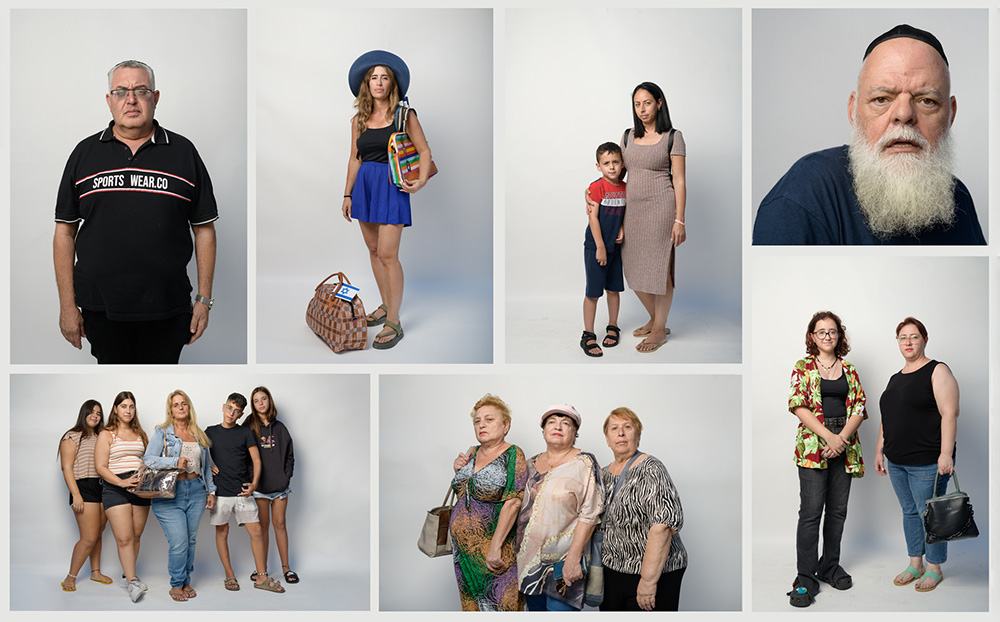
One hundred days after we met them for the first time at a shopping center by the Dead Sea hotels, we returned to Sderot residents to hear what’s changed since they first had to evacuate their city.
Sderot, a city of around 30,000 less than 10 miles from the Gaza Strip, is the most populated area to be evacuated after the Oct. 7 massacres. More than 70 Israelis were killed in Sderot on Oct. 7.
Since then, the population has been evacuated to hotels, mostly at the Dead Sea. Staying in hotels provides security but also causes difficulties. Not everyone deals with their trauma in the same way. There are those who need therapy, and there are those who find solace in hiking. There are those who enjoy the company of others and there are those who prefer to be alone. Thinking about children or the elderly who are spending long stretches of their lives in these hotels can be a source of pain for families. But there are also festive Friday celebrations and a sense of family.
The Sderot residents we spoke to are not necessarily a representative sample. Despite their different ages, identities, and outlooks, all have vivid memories of Oct. 7. They have not forgotten the horrors they witnessed before leaving home. One family has already returned to Sderot. Some have briefly visited their homes, not sure when or if they will return. It seems that they all share a common hope: not to be forgotten.
“How will I return? That’s the question”
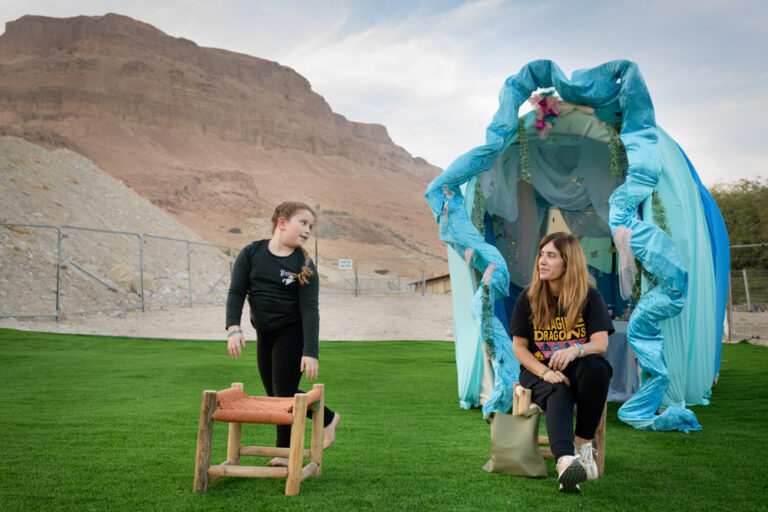
Liat Moyal Barsheshet (48) | married mother of two | Vert Hotel
Liat, 100 days ago: We arrived at the Dead Sea four days after [Oct. 7]. My brothers' house was damaged, but luckily no one in the family was physically harmed. Both parents of my daughter's second grade friend were murdered. We have no choice but to return, but at the same time I have a lot of concerns and thoughts about how to really do this. It's something new to return home and not be safe inside, not a thought I had before. It’s a different kind of threat.
Liat today: We are getting used to a virtual reality that’s going to blow up in our faces. I’ll return when they leave me no choice, when they stop funding the hotels.
How will I return? That’s the question. I haven’t been back to the city once. There’s a sense that I should, but what do I have to look for there right now? There are still booms, and a boom is a boom.
With the girls there are difficult challenges. The eldest is 11 and there is a loss of parental authority given the situation and adolescence. There’s a sense of security at the hotel, but new problems have arisen: what are they doing downstairs when I’m in the room? Who do they meet in the elevator? The school established in the Royal Hotel is trying to deal with this. I’m thrilled to go to the resilience center for children that was established here for us. I don’t get to be here much, but the people are amazing
What keeps me going? The joy of life. That I know—not always, but I know—how to turn lemons into lemonade. To have desires, to participate in all the activities that are available. In the morning the girls are in the frameworks, so I have time for myself. Happily, the Tamar Regional Council organizes trips three days a week, So I keep myself busy. When the circumstances are tragic, it’s sad to say, but in all this there is beauty. People have found themselves. They dare to think about changing jobs, doing things. Leaving the hotel will also be a farewell. A big family has been created here.
“I’m not a phoenix. It’s hard for me to recover”
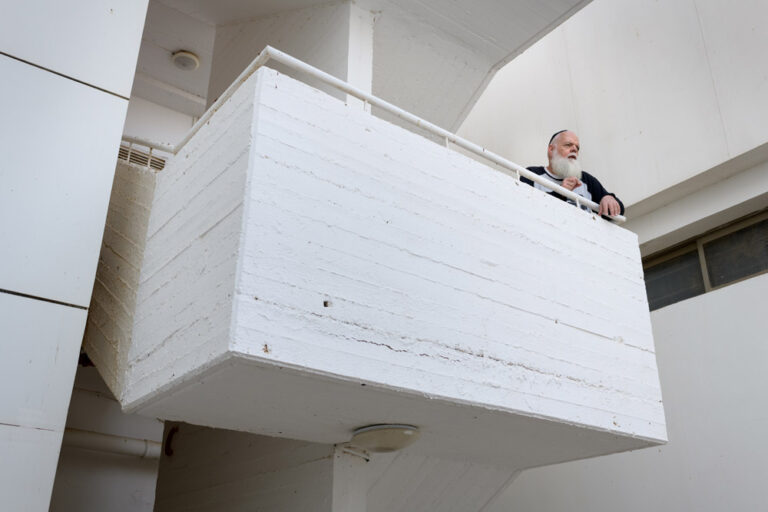
Shalom Shimon Jarbi (62) | married father of one | Lot Hotel
Shalom, 100 days ago: I don’t want to leave the hotel. I feel protected here, in a dream I’m afraid to wake up from. There are a lot of volunteers who help us and embrace us.
Shalom today: I’m still on a roller coaster. I haven’t found anyone to press the switch to stop. What happened to me on Oct. 7 shook me very, very hard. I’m not a phoenix. It’s hard for me to recover.
When I saw that my ultra-Orthodox son was calling on Shabbat, I realized it was something else. A moment before I closed the windows, I saw that outside looked like a war zone. I lost some friends. On the second day after the attack, we left Sderot in a convoy organized by the Home Front Command and arrived at the hotel.
In January 2005, before the disengagement [from Gaza], I got up in the morning to go to synagogue and a missile fell on our building, hitting people and I was injured in the forehead. I continued as if nothing happened. Only two years later it came up in a conversation with the family doctor. That’s what post-trauma is like. There is a lot of support and envelopment, and with all this, in the end I feel alone.
In the hotel, everyone is to themselves, and that’s a good thing. I don’t have the mental strength to listen to other people’s problems. I have a professional team that listens and gives directions. I need help, not empathy and sympathy.
My routine is gray. I don’t work at Tambour [the paint company], I have no other colors to offer. I don’t participate in the activities at the hotel. I sit in my room. Day after day. I know every corner of the room, every step. It's me, only the setting in the room has changed. But the walls are not reinforced concrete, so I’m a little afraid. I haven’t returned to Sderot yet. I left with trepidation and now I don’t want to return.
Nothing calms me down. Sorry for being pessimistic. My therapists say I’m not in the Olympics and I’m not in a hurry, but it stresses me out that they’re thinking of bringing us back home. How is that being talked about? Even here I’m scared and worried and you’re going to bring me back? The missiles keep flying. There are ministers and a prime minister with cars and offices, and yet they can’t look after me?
It’s better to live in a building in Tel Aviv that has a guard at the entrance. People have completely lost faith. We need to shout that the emperor has no clothes.
“A fork drops, and I jump”
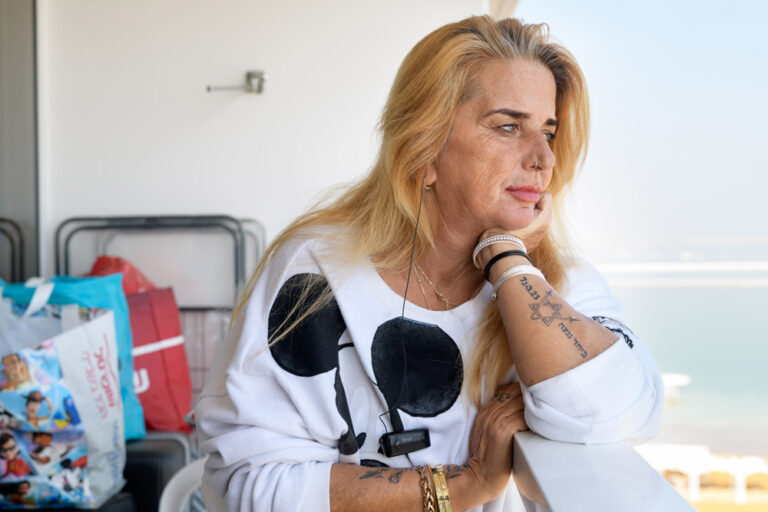
Ronit Amar (43) | Divorced mother of six | Vert Hotel
Ronit, 100 days ago: We arrived at the Dead Sea three days after the attack on Saturday. The children entered the safe room, but I didn’t. I stayed outside the safe room to watch over them. We were given an appointment to return to Sderot on Nov. 2. God knows what will happen. From my perspective, I’m already going back.
Ronit today: I don’t want to talk about Oct. 7. I want to forget, to know what’s next. I have 19 tattoos, and I got a tattoo of iron swords, so as not to forget the day. Not that I will forget, but I’m trying to forget.
People think we’re enjoying ourselves here, but we’re not enjoying ourselves. We have no more reality. We’re all refugees. I’ve been to a psychiatrist four times. No pill helps me. A fork drops, and I jump as though something happened. How do you explain that? Here, people clean up for me, free food, free bed, and I’m willing to trade with anyone else.
Only God and my children give me strength. The truth is, for the first month and a half I wanted to go skydiving here. Now I’m better, even though I lost my mother two weeks ago. If it wasn’t for the children …
In the beginning we didn't receive grants, they brought us donations. We felt like refugees, without clothing, without anything. There was an option to go down and ask for hygiene products, minimal things. After the first grant from the state, I came to ask for shampoo and conditioner for the children, before they came from their boarding school in Netanya. A reservist who worked there said to me, you got a grant, so go to the supermarket. I gave up and left. It was as if a knife had been inserted at that moment.
Every now and then I run away from the hotel, doesn’t matter where, walk around for a few hours and come back. There’s a lot of gossip. I don’t mix. I like my quiet, my corner. I have 5,600 followers on Tiktok. It’s better to meet strangers who empathize with you and understand the situation.
A few days ago I returned to Sderot for the first time. I just took my things and ran away. Not from fear, from the feeling that it doesn’t belong to me. Entering the house and feeling cold and empty. We need to destroy, destroy, destroy. If they don’t destroy Gaza, we’re not coming back. Everyone is a terrorist there. What is our reality? Fear? Nightmares? Anxieties? Why this uncertainty? Why did they stop taking them out? Come tell the truth. Don’t let people live in an illusion.
I don’t believe in this country. Not even in Bibi, with all the respect that Bibi gives and Bibi does. There is no faith in them. Only our mayor [Alon] Davidi. No one’s better than Davidi. Through fire or water, whatever he says, I do.
“In the hotel we became like family”
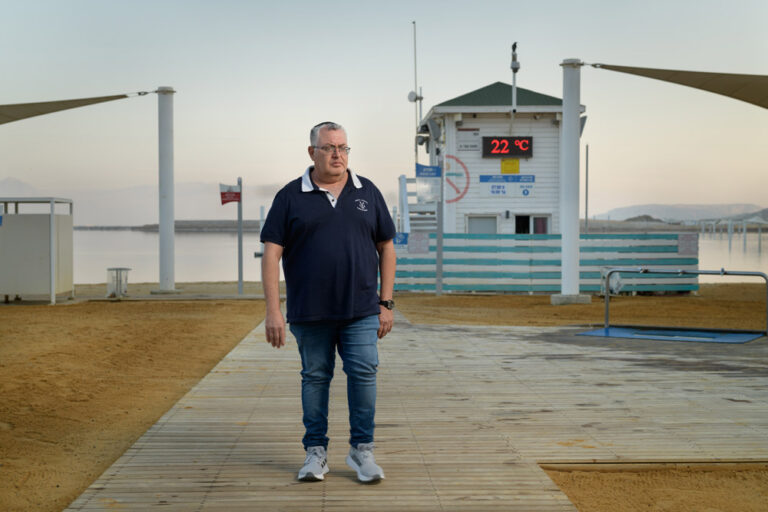
Asher Ohion (58) | married father of five | Lot Hotel
Asher, 100 days ago: We don’t know what will be, and there’s not going to be security as long as there are terrorist cells. There’s anger toward the government. Our mayor has warned for a long time that we need to go into Gaza and take down Hamas. They’re worse than ISIS. We’re willing to suffer a month, two months, for it to be quiet and to finish this business with the Qassam rockets.
Asher today: All day long I think, thoughts about the mortgage, loans. I take walks to relax. I’m stressed about what will happen in terms of security, also financially and in terms of work. I don’t know what will happen. We’ve endured years of violence and shootings. I still feel like I'm on a trip.
I get up every day at four in the morning, go back to sleep after an hour, wake up at quarter to seven, go pray. Then my wife and I go downstairs together for breakfast. She goes to her job at the kindergarten they set up in the hotel, and I go to my room, make arrangements, and leave for a walk. Then we go to lunch together, go back up to the room to rest. At four thirty we go to synagogue, sit in the lobby for a while, eat dinner, then sit with friends, talk. Once a week I go to Eilat to see the children and grandchildren.
On the Saturday of the attack, I was about to go to synagogue. A neighbor stopped me at the entrance of the building and saved me. There were terrorists 15 meters from me. They surrounded the synagogue and threw two grenades into the synagogue that did not explode. I have a son who served at the Nahal Oz outpost, but he returned home on the Wednesday before Shabbat for Simchat Torah. His friends at the outpost were killed. He went into shock, did not leave the room for three days. Now he has returned to the army to another outpost.
Everything has changed for me. I was a religious person before, but spiritually I got stronger. I also got better at cigarettes. But I try to cut back. A month ago, a rocket fell on the wall of the yard of my house in Sderot. I took down the sukkah not long ago before winter came. We did it quickly, out of fear. You enter your house and you feel as if it isn’t yours. From the confusion I tried to open the door of the house with the key of the hotel room. I open my wardrobe, and remember, oh, these shoes are here. I told my wife that we will redesign the house like the hotel room.
From my work at Dahan supermarket I know many people in the city. Until now it was just “hi, hello,” but at the hotel we became like family. They invited me to the children’s wedding. We bonded. We are planning a trip to Morocco together. In the synagogue I would sing and entertain, and now I am really part of the entertainment team of the hotel. On Friday evenings they put out desserts, get Arak, and we sit until three in the morning. There are no tensions in the hotel.
Everyone who stayed alive in Sderot was saved from death. The terrorists were in every corner. We have to thank God.
I will not leave Sderot. My whole family is there. People do not want to leave the city. I believe that Sderot will grow. Because of the situation, many will come to strengthen the place. Why did I build my life, so that I would be in exile? I want to return to my home.
“I talk to people and see bodies on the floor”
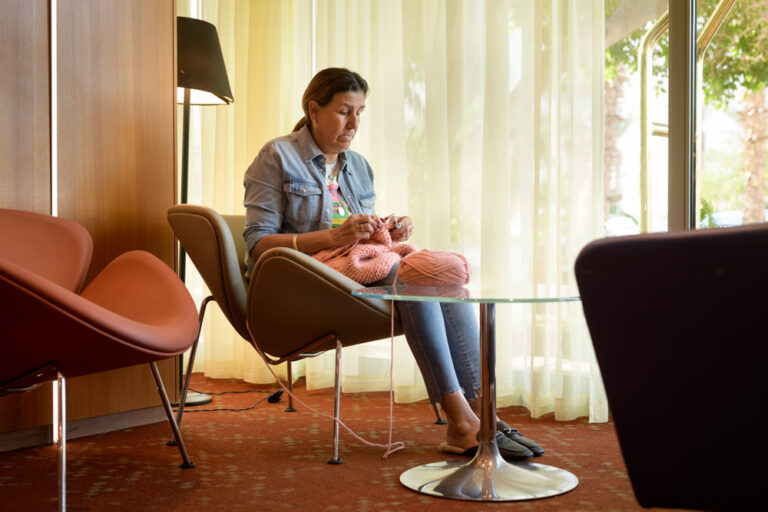
Zahava Abu (63) | married mother of four| Lot Hotel
Zahava, 100 days ago: I don’t see myself going back to Sderot. We bought everything here, what will we do with 1,000 shekels [$272] from the state? The important thing is that the state takes care of us. I’m on pills, shaking with fear. I want mental health.
Zahava today: I’m still in that day. I can’t eat or drink. It’s in my head. I talk to people and see corpses on the floor. The other day I dreamed that a rocket was coming to the Dead Sea. I’m sure that what happened in Sderot was cooperation from within, otherwise how can you explain it?
People don’t sympathize and know what’s happening with us. We don’t need boxes [of donations]. It doesn't comfort me. Be with us both in good and bad. Disconnect from politics, nobody cares about right nor left. I’m interested in what happened with the police, where were they when people were slaughtered, our good friends.
We had a trip to Jerusalem, and as soon as we got off the bus we started to breathe. We were in Nahalaot and the market. It was beautiful, but inside it was sad. I said to myself, why can’t we be like this, sit and drink and laugh and enjoy ourselves?
They say that time heals. In this case, it doesn’t heal. I’m not optimistic. When [Hamas head Yahya] Sinwar says he will arm himself and do it again, I believe him. I want to believe that I am returning home, and we can go out to a cafe, take a walk. Hopefully the army will do it.
“Who will take care of the children if I don’t?”
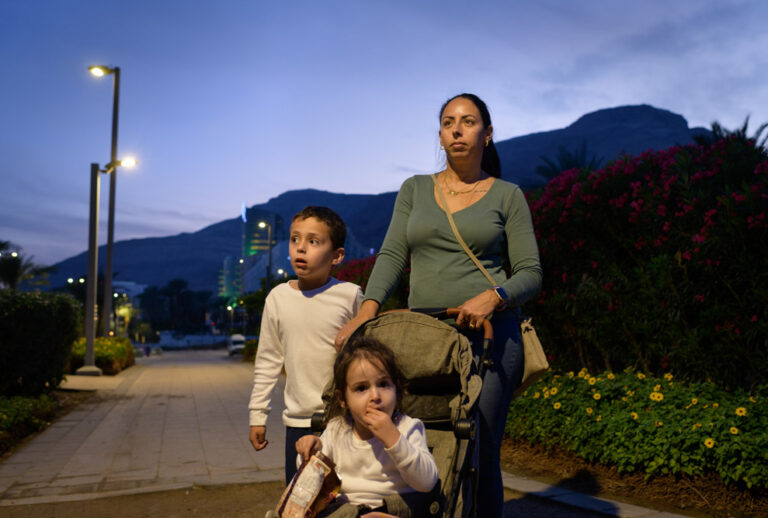
Michal Rickashpon (36) | married mother of two | Vert Hotel
Michal, 100 days ago: What happened was a failure in every sense, but my anger was directed towards Hamas, not the government. The children want to return home, but it’s impossible. I’m afraid to return, but this is our home, and when the war ends we will return.
Michal today: My husband is back to work at the factory, four days working, three days here. We, the parents, are in the dark. We are constantly talking about returning to normal, but we will return when there is security, when there will be no fear that in a year or two more terrorists will infiltrate. This scarred us all.
In the first days, when we were still at home, I went into severe anxiety and depression. I lost two people close to me. My sister's husband, who was murdered at the party, and a relative who was killed by a missile that penetrated the safe room at home in Ashkelon. I saw the terrorists near our house with my own eyes. Everyone said it was a miracle they didn’t enter where we were.
I have two children on the spectrum. The boy didn’t leave the safe room for a day and a half, and he reacts to noises in an extreme way. The girl too. Families with children with special needs are evacuated straight away. This time there was a bit of a delay, because there were terrorists, but they take care of us, enveloping us. The children are in educational frameworks, they’re being taken care of, especially the older one. They opened “Krembo Wings” [the youth movement for children with special needs] here. Special education received the most here.
I didn’t think it would be for such a long time. My only hope is that the hostages will be returned and that the soldiers will take care of themselves. I fall apart with every [news update that gets] cleared for publication, but I try not to do so near the children. It crushes them too. They’re sensitive to me.
I’ve started to take care of myself. I found employment, I’m exercising, and that shows strength. Who will take care of the children, if I don’t?
“I don’t know if I want my children to continue living in Israel”
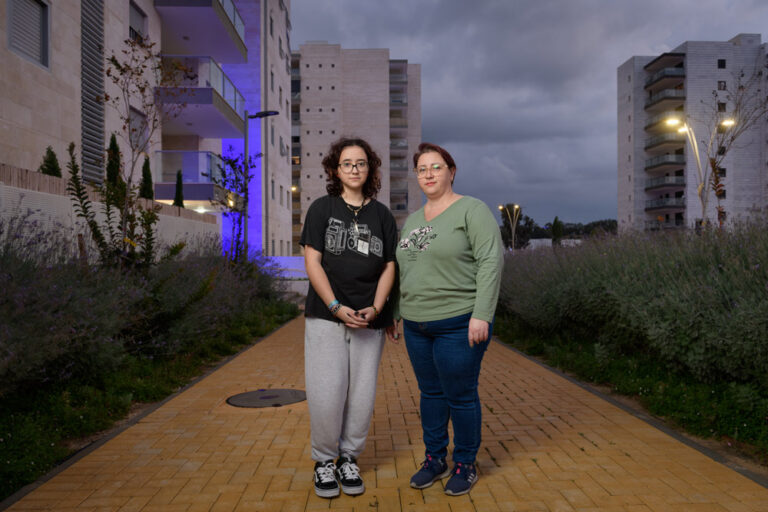
Milena Sheinerman (39) | Immigrated from Uzbekistan in 1993, married mother of two | Returned to Sderot from Vert Hotel
Tal Shinerman (16)
Milena, 100 days ago: I’m angry with the state. It’s a failure of the government. There were warnings, and they didn’t give it any importance. They could have really reduced everything that happened if they had been working. It’s not the army’s fault. The army is strong, and you can see right now how motivated the soldiers are, but there are political factors that need to activate them. I work in an essential factory for medical products and we have just been ordered to return to work. At first I will return alone, because of work, and the family will stay until it is possible to return.
Milena today: We returned to the city after a month at the Lot Hotel. We were perhaps the third family to return to the building out of 50 families. We still feel the war, hear the explosions all day. Tal is on Zoom, two or three hours a day, with her class. But there isn’t always class. One good friend of hers is still here. But we hardly see people. We don’t go out. In the evening it’s scary, because it’s quiet here and I don't agree to go out.
Tal: It was fine at the hotel, but I wanted to go home. There were four of us in the same room and it was difficult. My mother lived alone at home and it was very difficult for her to leave. We tried to convince her. The older brother, who also lives in Sderot, asked us to wait and see what happens, that maybe the situation will improve. But then, in the middle of the week, when we already wanted to leave, they said that all the evacuation places were already filled. We had to stay at home until the end of the week. We never left. It was the first time we left the city during such a period.
Milena: We locked ourselves in the house, Tal found a way to close the door with a pile of books. We slept with a knife under the pillow. The first week all the shops in town were closed, and we asked the municipal center for some help, so they came and brought a package.
We left our parrot Jacko at home, once a week we came to feed him. I told everyone that he was waiting for this opportunity, he enjoyed being alone. A month after we returned, my son was on Zoom. Suddenly he heard the code red alarm and ran to the safe room. Only then did he realize it was the parrot. We took the dog with us to the hotel. We wouldn’t go out without him.
Now the anger is different. At first there was a feeling that we were winning. Now I’m not there at all. I see the soldiers being killed, and our government seems to be living in another country, handing out money and [ministerial] portfolios. I don’t think anything will change. There will be no peace. With whom? With the people on the other side of the fence? This would have to go on for years for there to be nothing there. If they were to erase them completely, I would believe that something would change.
I don’t know if I would want my children to continue living in Israel. I told them, if you ever want to leave, I won’t object. I don’t see their future. Every parent would think like that. We’re used to it already, but our children don’t deserve such a future.






